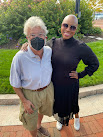On Friday morning October 7,
Boston Harbor advocates and activists joined Senator Edward Markey, Congresswoman Ayanna Pressley, Boston's Mayor Michelle Wu, USEPA Assistant
Administrator for Water Radhika Fox and Regional Administrator David
Cash, and MADEP Commissioner Martin Suberg at Piers Park in East Boston to celebrate the 50th Anniversary of
the Clean Water Act (CWA) on Boston Harbor. There was lots to celebrate.
Just 30 years ago, Boston Harbor was a national disgrace. Today, it is home to the cleanest urban beaches in the nation. Though the Clean Water Act is a critical tool in the fight for clean water, the existence of the CWA is not enough to guarantee environmental victories. If it were, every harbor in the nation would be as clean as Boston Harbor is today. Sadly, many are not.
As we work together to protect the gains we have made, regulators and decision makers need to recognize that though effective legislation and litigation are necessary they are not sufficient to guarantee the public’s right to clean water.
So how do we explain the "Boston Harbor Success Story"?
On December 23, 1985, in his first order in the Boston Harbor Case, the late U.S. District Court Judge A. David Mazzone wrote “The Law secures to the people the right to a clean harbor.” The law that he referred to is The Federal Water Pollution Control Act of 1948, as amended in 1972, now known as the Clean Water Act (CWA). This ambitious Nixon-era law created a framework for regulating the discharge of pollutants into the waters of the United States and gave the USEPA broad authority to set standards for wastewater. It also funded the construction of sewage treatment plants, before that was phased out by President Ronald Regan, a fact that his Vice President George H. W. Bush conveniently ignored when he cynically made Boston Harbor an issue in his 1988 Presidential campaign against Massachusetts Governor Mike Dukakis.
Save the Harbor/Save the Bay's Founding Chair Beth Nicholson often says that "Environmental victories are seldom won outright, they are just
postponed to another day." That observation seems particularly poignant today, with the Clean Water Act - and the environmental victories we have won in the past 50 year under assault by an increasingly partisan Congress and increasingly conservative courts.
The best protection we have against assaults on clean water is an unassailable and enduring consensus of thousands of people from every community and all walks of life who believe in the power of clean water to transform communities and improve people’s lives. That’s precisely what we have done here in the Bay State, where access to clean water is a core family value.
Over the years, we have learned that best way
to strengthen that consensus so that it cannot be undone by a change of
administration, the stroke of a pen or a reactionary court, is to share
the benefits of our
$5 billion investment in clean water with all
Bostonians and the region’s residents alike.
Save the Harbor’s Executive Director Chris Mancini puts it well when he says that “The best way to “Save the Harbor” is to “Share the Harbor” with everyone, regardless of their race, their ability, or the language they speak."
 |
| The best way to "Save the Harbor" is to "Share the Harbor" |
"That's why Save the Harbor/Save the Bay brought more than 5,000 kids and families on free trips to the Boston Harbor Islands this year." he continued. And that's why we run free youth and beach programs that have connected more than 250,000 people to the harbor we have worked so hard to restore and protect since our free programs began.”
It is a powerful and proven strategy, which has been embraced by Governor Baker and former Governor Patrick, the Department of Conservation & Recreation as well as Legislative leaders including Sen. Brendan Crighton of Lynn and Rep. Adrian Madaro of East Boston, who Co-Chair the Metropolitan Beaches Commission. In the spring, the Commission will release a report on improving beach access for people of color, people with disabilities, and those who do not speak English as their first language, which they hope the next administration and the Department of Conservation & Recreation will embrace as well.
As we celebrate the Boston Harbor success story today all of us owe a debt of gratitude to Judge Mazzone, the USEPA, the Department of Justice and the other lawyers who took part in the Boston Harbor Case. We also owe a debt of gratitude to the women and men of the Massachusetts Water Resources Authority for their extraordinary work, and to the region’s ratepayers, who continue to pay the bills that make it all possible.
But most of all we owe a debt of gratitude to the tens of thousands of people who make up what the Save the Harbor Co-Founder Ian Menzies called a “barely restrained but well-disciplined mob” to demand a harbor that is safe for boating, fishing and swimming “damn near every day” as Judge Mazzone had hoped.
Advocate, author, educator and avid
angler Bruce Berman is Lead Consultant to the Metropolitan Beaches
Commission and has served as Director of Strategy & Communications
for Save the Harbor/Save the Bay since 1990.
Berman is the editor of The View From Sea Level, curates the web portal www.bostonharbor.com, and live streams
from the Verandah at Constitution Marina on Boston Harbor at https://www.youtube.com/bostonharbor
and https://www.facebook.com/bostonharbor



No comments:
Post a Comment